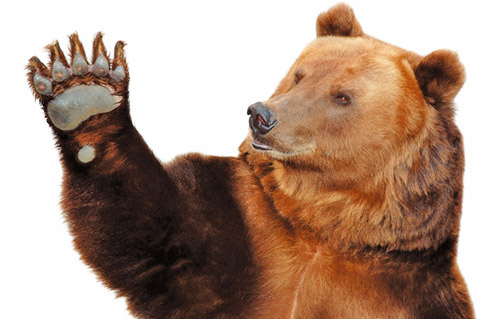
One could argue that the most famous bear in Jewish history is Fozzie Bear. He was one of the original Muppets, a bear with breathtakingly bad comedic skills. His timing was lousy, his material was weak and his punchlines were painful, which means he would be perfectly qualified to write for this Oy Vey column. Fozzie the Bear was voiced by none other than Frank Oz, whose father was Jewish, and as legend goes, at least some of Fozzie’s schtick was based on the classic Borscht Belt comedians. Fozzie the Bear also performed magic and was renowned for pulling a rabbi (as opposed to a rabbit) out of a hat. Other Jewish-themed magic tricks might include sawing a chazzan in half, “Levi”tation and (Kiddush) Cups & (Matzah) Balls.
Bears actually are mentioned a few times in the Tanach. For example, in Shmuel a story is told of David’s encounter with a lion and a bear:
“And … there came a lion and also a bear, and carried off a lamb from the flock. And I went out after him and smote him, and saved it from his mouth. And he arose upon me, and I took hold of his jaw, and I smote him and slew him… And David said, “The Lord Who saved me from the paw of the lion and from the paw of the bear, He will save me from the hand of this Philistine.” (Shmuel 1, Chapter 17, lines 34-37) Apparently, a bear’s paw can be unbearably painful so when confronting a bear, bear it in mind or you’ll be bearing the brunt of the paw and bearing witness to your own demise.
Bears are mentioned elsewhere in the Tanach including a story involving the prophet Elisha: “And he went up from there to Bethel, and he was going up on the road and some little boys came out of the city and jeered him, and said to him, “Go away, baldy; go away, baldy!” And he turned around and saw them, and he cursed them in the name of God. And two she-bears came out of the forest and tore apart forty-two boys of them.” (2 Melachim 2, line 24) This story suggests that calling a prophet a “baldy” is not a good idea and that she-bears are not to be trifled with. Other things in life also should not be trifled with including a (i) bride who is having a very difficult time squeezing into her wedding dress, (ii) ravenous groom who was so busy during kiddushin that he never made even one trip to the smorgasbord and (iii) parents who have just been handed the invoice for the wedding and discover that they have been charged a massive overtime penalty simply because the wedding went past the 5-hour time limit by a mere 10 minutes.
Bears are mentioned in the Talmud too: “The one who says there was a miracle claims that there was already a forest in that place but there were no bears, and the miracle was the appearance of bears. The one who says it was a miracle within a miracle claims that neither was there a forest nor were there bears in that area… Why was a double miracle required?… The forest was necessary, as bears are frightened to venture into open areas but will attack people in their natural habitat, a forest.” (Sotah 47a) One lesson from this passage is that when in a forest, one should beware of bears. Of course, in life there are other potentially dangerous locations like (i) the line at the bagel store the day before Yom Kippur, (ii) a hotly-contested synagogue board meeting to determine the fate of a rabbi beloved by exactly half of the membership and detested by the other half and (iii) the room wherein the parents of a bar mitzvah boy confront him after he delivers a completely impromptu and unauthorized speech in shul in which he applied the parsha to his family’s most embarrassing secrets.
The Talmud also has something to say about bear behavior: “As a roaring lion, and a ravenous bear, so is a wicked ruler over a poor people … And Rav Yosef taught that those who are referred to as a bear in the verse are the Persians. They are compared to a bear, as they eat and drink in large quantities like a bear….” (Megillah 11a). If bears “eat and drink in large quantities,” then at least in that respect, bears and Jews arguably have something in common.
Final thought: What type of bear lives in the north and south and is extremely moody? A bi-polar bear.













